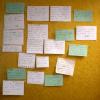Related Content
 |
Balance Technical and Social Skills for Project Success Software testing is a socio-technical undertaking, which means that effective test strategies must incorporate a balance of technical capabilities relating to processes and tools and social capabilities used for communication and problem-solving. This balance enables true project success. |
|
 |
Use Continuous Backlog Grooming to Refine Agile Requirements Continuous backlog grooming means systematically refining your user stories: breaking up larger stories, obtaining detailed requirements, writing the requirements in terms of acceptance criteria and acceptance tests, and sharing and refining these details with the team. Acceptance test-driven development can help. |
|
 |
Technical Debt, Product Value, and Risk Management Reports that the Equifax breach took advantage of a known issue in Apache Struts set the stage for a conversation about technical debt, product value, and risk management. Steve Berczuk shares his thoughts on how to help prioritize technical work in a way that balances short and long term value. |
|
 |
3 Proven Strategies for High-Quality IoT Applications IoT apps extend test activities to more devices, test cases, and compliance requirements. Handling this extension while maintaining high quality can be done with planning, innovation, and careful execution. Here are three recommendations for expanding your test strategies to ensure high-quality IoT applications. |
|
 |
Want to Become Agile? Get Ready to Make Countless Mistakes It’s not easy, but to find success with agile, you need to become comfortable not only taking risks, but watching those risks lead to real failure. Not every idea is going to be a winner, but more often than not, those failures lead to an even greater success. |
|
 |
Robots and Origami: Designing and 3D Printing Foldable Robots Origami is no longer limited to folding a sheet of paper into a crane. Now there’s Interactive Robogami, a new system under development from researchers at MIT that gives those of us who are neither a roboticist nor a mechanical engineer the tools to design our own robots. |
|
 |
4 Ways to Restore Purpose to Your Daily Scrum The daily scrum was created to help the Scrum team meet its sprint goal. Unfortunately, answering the three daily questions can turn a synchronization and planning meeting into a status report. Here are four ways to make sure your team members are collaborating about their work and are ready to tackle the next day. |
|
 |
Growing Generalized Specialists on an Agile Team A generalized specialist is not a jack of all trades. It is an individual with deep knowledge in a particular specialization who also has learned to be productive in other team roles. Here are some tips on how to grow generalized specialists on your team in order to maximize your team's productivity potential. |








